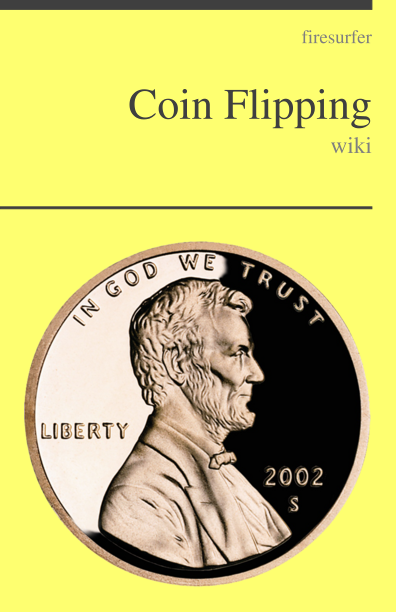Coin flipping
Coin flipping, also known as a coin toss, is the practice of throwing a coin into the air and checking which side is showing when it lands, in order to choose between two alternatives. It is a form of sortition which inherently has only two possible and equally likely outcomes.
The historical origins of coin flipping are the interpretation of the chance outcome of the toss as the expression of the divine or holy. In ancient times, people believed that the result of a coin toss was the will of the gods. Today, it is a simple and unbiased decision-making process used in various situations, such as sports, where it is often used to decide which team gets the choice of starting or receiving in the game.
Procedure[edit | edit source]
The procedure for a coin toss is simple and straightforward. A coin is thrown into the air such that it rotates edge-over-edge several times. Competing calls of "heads" or "tails" are made, either before the coin is tossed, or while it is in the air. Once the coin lands, the side that is facing up is declared the winner. The outcome is considered random, with each side having an equal chance of landing face up.
Applications[edit | edit source]
Coin flipping is used in many different applications. In sports, it is commonly used to decide which team gets a particular advantage at the start of a game. In decision making, individuals or groups may use a coin toss to settle disputes or choose between equally desirable or undesirable options. Coin flipping is also used in statistics and probability theory to illustrate basic principles of probability.
Mathematical Analysis[edit | edit source]
The mathematical analysis of coin flipping is concerned with understanding the probabilities of the outcomes. Assuming the coin is fair, the probability of either "heads" or "tails" is 50%. However, real coins might not be perfectly symmetrical, and the way a coin is flipped can affect the outcome. Researchers have studied the physics of coin flipping to determine under what conditions, if any, the outcomes can be predicted.
Cultural Impact[edit | edit source]
Coin flipping has a significant cultural impact and is often depicted in literature, film, and television as a method of resolving conflicts or making decisions. It symbolizes the randomness of fate and the uncertainty of life's choices.
See Also[edit | edit source]
| Coin flipping Resources | ||
|---|---|---|
|
| |
Translate to: East Asian
中文,
日本,
한국어,
South Asian
हिन्दी,
Urdu,
বাংলা,
తెలుగు,
தமிழ்,
ಕನ್ನಡ,
Southeast Asian
Indonesian,
Vietnamese,
Thai,
မြန်မာဘာသာ,
European
español,
Deutsch,
français,
русский,
português do Brasil,
Italian,
polski
Navigation: Wellness - Encyclopedia - Health topics - Disease Index - Drugs - World Directory - Gray's Anatomy - Keto diet - Recipes
Search WikiMD
Ad.Tired of being Overweight? Try W8MD's physician weight loss program.
Semaglutide (Ozempic / Wegovy and Tirzepatide (Mounjaro / Zepbound) available.
Advertise on WikiMD
WikiMD is not a substitute for professional medical advice. See full disclaimer.
Credits:Most images are courtesy of Wikimedia commons, and templates Wikipedia, licensed under CC BY SA or similar.Contributors: Prab R. Tumpati, MD


